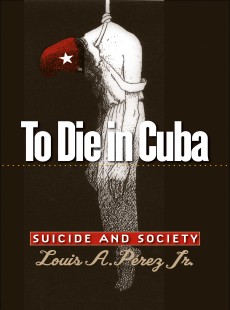
To Die in Cuba
Suicide and Society
Louis A. Pérez Jr.
 Publisher: University of North Carolina Press
Publisher: University of North Carolina Press
Imprint: The University of North Carolina Press
Published: 12/2012
Pages: 480
Subject: Social Science, Psychology, History
| University of North Carolina
Print ISBN: 9.78E+12
eBook ISBN: 9781469608747
DESCRIPTION
In a study that spans the experiences of enslaved Africans and indentured Chinese in the colony, nationalists of the twentieth-century republic, and emigrants from Cuba to Florida following the 1959 revolution, Perez finds that the act of suicide was loaded with meanings that changed over time. Analyzing the social context of suicide, he argues that in addition to confirming despair, suicide sometimes served as a way to consecrate patriotism, affirm personal agency, or protest injustice. The act was often seen by suicidal persons and their contemporaries as an entirely reasonable response to circumstances of affliction, whether economic, political, or social.
Bringing an important historical perspective to the study of suicide, Perez offers a valuable new understanding of the strategies with which vast numbers of people made their way through life--if only to choose to end it. To Die in Cuba ultimately tells as much about Cubans' lives, culture, and society as it does about their self-inflicted deaths.




